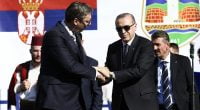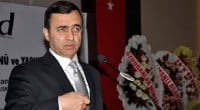Comments on Turkey coup attempt by Prof. John Whyte
Date posted: July 20, 2016
Prof. John Whyte’s comments on recent coup attemtp in Turkey.
Source: CTV Regina News
Tags: Defamation of Hizmet | Fethullah Gulen | Military coups in Turkey | Persecution of Hizmet by Erdogan |
Related News

Gülen says he could be blamed for assassination of an MHP, CHP politician
US-based Turkish Islamic scholar Fethullah Gülen said on Monday that the possible assassination of an important politician from either the Republican People’s Party (CHP) or the Nationalist Movement Party (MHP) in the coming days might be blamed on him by pro-government circles.

Bishop Chane: Gülen one of the greatest scholars
Eighth Bishop of Washington in the Episcopal Church John Bryson Chane has said Turkish scholar Fethullah Gülen is probably one of the greatest scholars and religious people in today’s world. Speaking at a Jan. 20 meeting of the Rumi Forum, a think tank established by Turks living in Washington, D.C., to foster intercultural dialogue, the […]

“We will root out every single Gülenist from the Balkans,” Erdoğan says in Serbia
People affiliated with the U.S.-based Islamic preacher Fethullah Gülen will be “rooted out” from the Balkans, President Recep Tayyip Erdoğan said on Oct. 11 in a speech in the Serbian town of Novi Pazar.

Ankara forces Arbil to close Turkish schools in KRG
Prime Minister Recep Tayyip Erdoğan asked Kurdistan Regional Government (KRG) Prime Minister Nechirvan Barzani to close Turkish schools in the autonomous region of Iraq during Barzani’s visit to Turkey in mid-February, according to sources close to the KRG prime minister.

Illegal raid against Bank Asya spells disaster for Turkey, says TUSKON head
“The raid on Bank Asya is a violation of the right of proprietorship and a murders the entrepreneurial spirit,” noted the president of the Confederation of Businessmen and Industrialists of Turkey (TUSKON), Rızanur Meral, in an interview with Bugün TV.



















